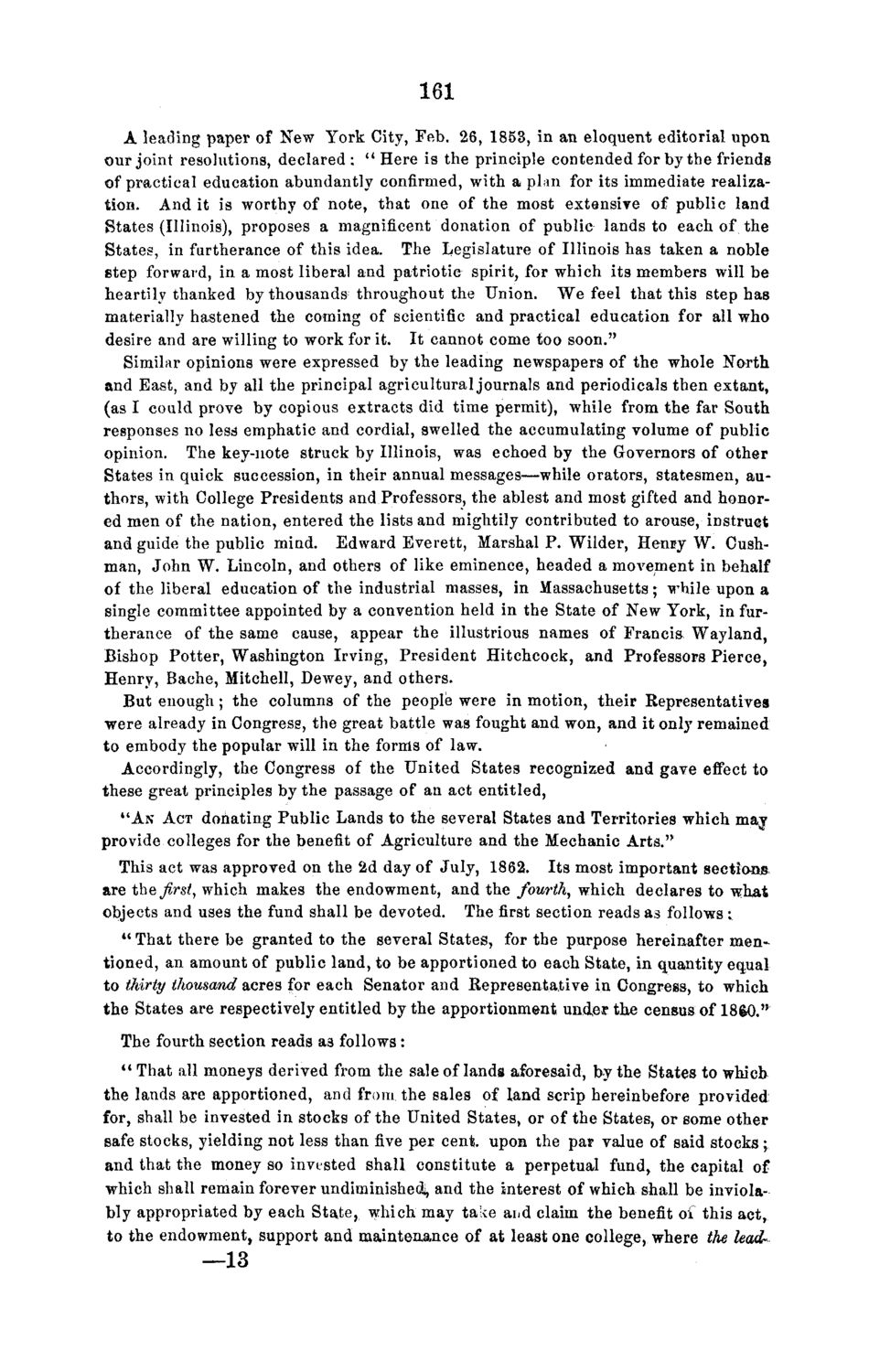| |
| |
Caption: Board of Trustees Minutes - 1868
This is a reduced-resolution page image for fast online browsing.

EXTRACTED TEXT FROM PAGE:
161 A leading paper of New York City, Feb. 26, 1853, in an eloquent editorial upon our joint resolutions, declared : " Here is the principle contended for by the friends of practical education abundantly confirmed, with a plan for its immediate realization. And it is worthy of note, that one of the most extensive of public land States (Illinois), proposes a magnificent donation of public lands to each of the States, in furtherance of this idea. The Legislature of Illinois has taken a noble step forward, in a most liberal and patriotic spirit, for which its members will be heartily thanked by thousands throughout the Union. We feel that this step has materially hastened the coming of scientific and practical education for all who desire and are willing to work for it. It cannot come too soon." Similar opinions were expressed by the leading newspapers of the whole North and East, and by all the principal agricultural journals and periodicals then extant, (as I could prove by copious extracts did time permit), while from the far South responses no less emphatic and cordial, swelled the accumulating volume of public opinion. The key-note struck by Illinois, was echoed by the Governors of other States in quick succession, in their annual messages—while orators, statesmen, authors, with College Presidents and Professors, the ablest and most gifted and honored men of the nation, entered the lists and mightily contributed to arouse, instruct and guide the public mind. Edward Everett, Marshal P. Wilder, Henry W. Cushman, John W. Lincoln, and others of like eminence, headed a movement in behalf of the liberal education of the industrial masses, in Massachusetts; while upon a single committee appointed by a convention held in the State of New York, in furtherance of the same cause, appear the illustrious names of Francis Wayland, Bishop Potter, Washington Irving, President Hitchcock, and Professors Pierce, Henry, Bache, Mitchell, Dewey, and others. But enough; the columns of the people were in motion, their Representatives were already in Congress, the great battle was fought and won, and it only remained to embody the popular will in the forms of law. Accordingly, the Congress of the United States recognized and gave effect to these great principles by the passage of an act entitled, " A N ACT donating Public Lands to the several States and Territories which may provide colleges for the benefit of Agriculture and the Mechanic Arts." This act was approved on the 2d day of July, 1862. Its most important sections, are the Jirst, which makes the endowment, and the fourth, which declares to what objects and uses the fund shall be devoted. The first section reads as follows i " That there be granted to the several States, for the purpose hereinafter mentioned, an amount of public land, to be apportioned to each State, in quantity equal to thirty thousand acres for each Senator and Representative in Congress, to which the States are respectively entitled by the apportionment under ttte census of 18&0." The fourth section reads a3 follows: " That all moneys derived from the sale of lands aforesaid, by the States to which the lands are apportioned, and from the sales of land scrip hereinbefore provided for, shall be invested in stocks of the United States, or of the States, or some other safe stocks, yielding not less than five per cent, upon the par value of said stocks; and that the money so invested shall constitute a perpetual fund, the capital of which shall remain forever undiminished!, and the interest of which shall be inviolably appropriated by each State, which may take and claim the benefit of this act, to the endowment, support and maintenance of at least one college, where the lead- —13
| |